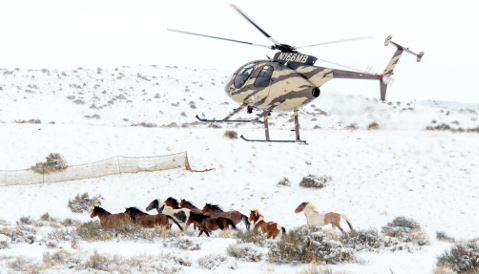Concerns Remain over Wild Horse Support in Federal Budget
Congress Indicates Support, but the Devil Is in the Details

The bipartisan, five-month spending deal that Congress approved last week includes provisions to protect America’s horses from slaughter. However, one provision represents a new threat to wild horses and burros because it strips them of their federally protected status and, if exploited, could open a backdoor to unnatural deaths.
First, the good news: The omnibus spending bill, which will fund the government until September, does continue the prohibition on commercial horse slaughter within the United States.
Because there is no federal ban on slaughter, Return to Freedom Wild Horse Conservation and other animal- and equine-welfare organizations must make a year-to-year push to ensure that taxpayer money does not fund horsemeat inspection, which would make opening a slaughter plant viable.
The bill also states explicitly that federal money “shall not be available for the destruction of healthy, unadopted wild horses and burros in the care of the Bureau [of Land Management] or its contractors or for the sale of wild horses and burros that results in their destruction for processing into commercial products.”
That language makes the intent of Congress plain.
For wild horses and burros, however, the devil is in the details.
Added on page 804 is a provision, Section 116, on “the humane transfer of excess animals” that animal- and equine-welfare organizations like Return to Freedom had worked to remove from the legislation — only to see it return from the grave in the final version.
The section enables the Secretary of the Interior to transfer “excess wild horses and burros that have been removed from public lands” to other federal, state, and local government agencies as “work animals” immediately upon request of that agency.
Immediate transfer raises a concern about whether the public and Bureau of Land Management (BLM) will be able to track the care of the animals, in the manner that BLM is required to check on the care of other adopted horses.
Importantly, transferred wild horses or burros will lose their federally protected status under the 1971 Wild Free-Roaming Horses and Burros Act.
The provision continues: The agency receiving the transferred horses or burros is barred from destroying them “in a way that results in their destruction into commercial products.” The agency is also prohibited from selling or transferring the animals in a way “that results in their destruction into commercial products.”
Both prohibitions are welcome, but absent is language banning an agency from selling or transferring the animals to a third party intent on slaughter for non-commercial purposes.
Lastly, Section 116 bars the receiving government agency from euthanizing the horses or burros “except upon the recommendation of a licensed veterinarian, in cases of severe injury, illness, or advanced age.”
The positive intent is clear but the language still does not define “advanced age.” Americans would not want animals put down simply because they have reached the end of their service.
Putting aside that Return to Freedom and others take exception to how the federal government defines “excess” wild horses as exceeding arbitrarily set “appropriate management levels,” or AMLs, this provision could, if abused, lead to the needless deaths of thousands of wild horses and burros.
The balance of the omnibus spending bill makes clear that Congress does not want to take a step backward, toward the days of horse slaughter, and that it wants BLM to treat wild horses and burros humanely. We applaud Congress for sending that message.
There are other positives about the bill and accompanying guidance, including the Wild Horse and Burro Program receiving a slight increase in funding, a provision enabling the Secretary of the Interior to enter into multi-year agreements with nonprofits to provide care for wild horses taken off the range, and a request that BLM produce a long-term plan within 180 days.
Unfortunately, there is still reason for concern. The Senate urged BLM to increase the pace of roundups, while Secretary of the Interior Ryan Zinke reportedly told an audience that included cattle ranchers that there was “a lot of America that looks at a horse as a pet, and there’s a lot of Westerners that look at a horse as livestock. But we should all look at a horse as a managed asset. Because overgrazing a horse is no different than cattle out there or anything else. We are going to take action on the horses.”
Return to Freedom has worked for 19 years modeling and advocating for improved range management and the judicious use of proven fertility control vaccines as alternatives to the costly and tragic capture, removal, and warehousing of wild horses and burros.
When wild horses and burros are removed from their rightful rangelands, it’s important that we do all we can to ensure that horses and burros receive the best possible treatment.
That will require vigilance from the public and from Congress. We urge leadership to begin by clarifying ambiguous language ripe for exploitation by those who see wild horses as a nuisance and disposable “asset” rather than as a valued and iconic asset of the past, present, and future of the American West.
Cory Golden is the advocacy and outreach coordinator for Return to Freedom Wild Horse Conservation, a Lompoc-based national nonprofit working to protect free-ranging horses and burros through sanctuary, education, advocacy and conservation.



